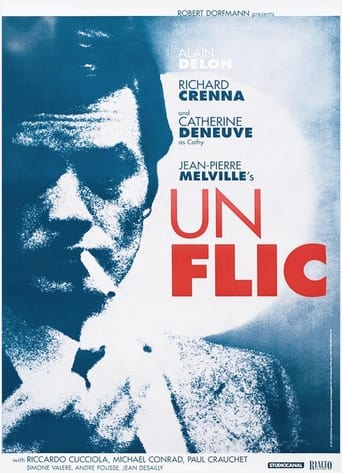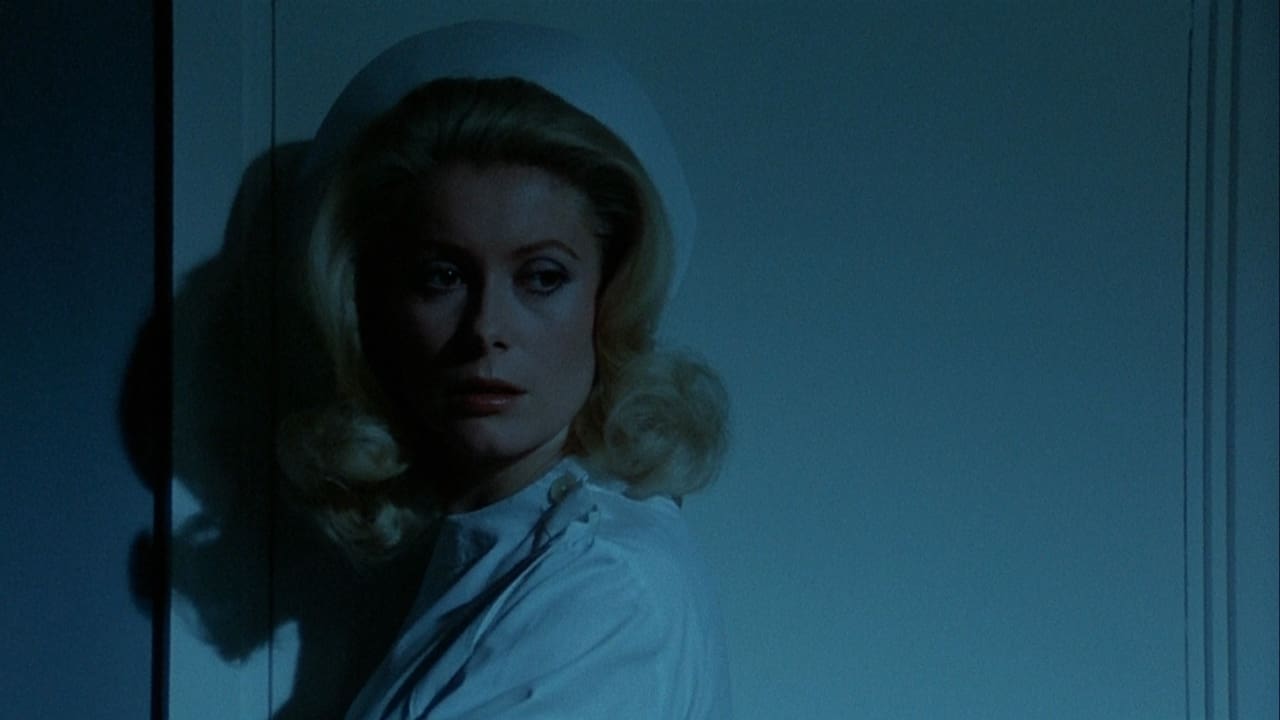Bill Slocum
Can a soufflé still taste good, even a trifle underbaked and missing an ingredient or two? The answer depends on the cook.Late one rainy afternoon, four men rob a bank in the French coastal town of St.-Jean-de-Monts, not without deadly complications. The lead crook, Simon (Richard Crenna), leads a double life as the owner of a French nightclub. One of his regulars is a quiet police inspector named Coleman (Alain Delon). In time, their lines of work will shake their friendship like nothing else, not even Coleman's affair with Simon's wife, Cathy (Catherine Deneuve)."Un flic" (A Cop), also known as "Dirty Money," is a film about the dehumanizing nature of police work. Coleman is suave but conflicted, willing to slap around a suspect or even a suspected suspect but not so hardened as not to be conflicted about that."This job makes us skeptical," his deputy Morand (Paul Crauchet) notes as the pair leave a morgue."Especially about skepticism," Coleman replies.Director Jean-Pierre Melville was a leading light of the New Wave movement, and his commitment to impressionistic pure cinema is on strong display right at the outset. We open on the sound of crashing waves, filling the screen with blue. The car with Simon and the other robbers moves slowly into position. With rain crashing around them on an empty street, three of the four men wordlessly get out in turn to take their positions in the bank.A short but portentous scene is played out through their eyes. Simon's are committed but apprehensive. The old pro who joins him first, Marc Albouis (André Pousse), reads cool and empty. In the car, a former bank manager named Paul (Ricardo Cucciolla) hesitates while the driver, Louis (Michael Conrad) looks at him hard. You can see the fear in Paul's eyes as he reluctantly leaves the vehicle to play his part.What is up with this scene? It features four French robbers, only one of whom is actually played by a Frenchman. Here, and in many other ways, Melville was clearly doing things his way, establishing meticulous realism in some scenes only to abandon it in others, most notably in a later train heist which features some fine suspense work but was clearly filmed with models.The weakest element for me in this movie is not the Tyco episode itself, but how it is integrated into the rest of the film. We have little idea how the train heist is being done, or why it leads to the final act the way it does. Yet its aftermath proves central to everything, by which time Melville is giving us not riddles but koans.Though employing real locations and real-time sequences, Melville doesn't seem nearly as interested in telling a solid crime story, with motives and meanings laid out. His film, like the dialogue sprinkled through it, remains elliptical all the way through."We're doomed victims, the prey of actual pros," is something a blackmailed homosexual tells Coleman, which serves as a kind of motif for the film. I don't think "Un flic" sells the idea as well as it thinks. If Coleman is a victim, it's of his own hard code.But "Un flic" keeps you watching and makes you think. And while casting an American as the lead crook and another as his key partner seems a strange conceit, dubbed as they necessarily are, both Crenna and Conrad make it work, playing their parts with the same elegant drabness that underscores every scene. Crenna's Simon is one character you come to care about, if only a little. Delon may be a trifle too mopey, but makes for an enigmatic center.As a crime story, it's pretty decent. As a cinematic tone poem, it's much better.
bobsgrock
Of Jean-Pierre Melville's earlier masterpiece Le Samouri, Roger Ebert described it as "nothing absolutely original... except for the handling of the material." This is certainly true of nearly all of Melville's films, who was fascinated with American crime dramas and noirs, right down to the very essence of the details. His protagonists (or antagonists) of sorts frequently dress as Bogart or other Hollywood lead men with their fedora hats, khaki trench coats complete with smoldering looks and hard-boiled attitudes. Much like Le Cercle Rouge and Bob le Flambeur, Melville obsesses over the details of his characters, far more interested in those than their overall motivations or actions. Indeed, frequently, Melville douses us with very long sequences (in Le Cercle Rouge it is almost 30 minutes) of dialogue-free situations that crank up the tension of the film simply by indulging us with every movement these characters make. Often it is depicting a crime of sorts, such as a jewelery store or bank robbery, which only heightens our interest in what is going to happen next. Because Melville was much more concerned with tension than action, the payoffs of these scenes often feels deflated and a let-down, most notably because American audiences are so used these days to being pummeled with all action and little to no tensional buildup that we sit there waiting for the action that never comes. This is exactly what Melville desires. Overall, this is perhaps the most ambitious of Melville's films and, unfortunately, his last. The lead actors are quite good, especially American star Richard Crenna and French legend of cool Alain Delon. Catherine Deneuve also makes a small appearance, although the film could have benefited greatly had she been used more extensively. Still, Melville is able to wow us simply with his crisp editing, sharp and focused direction and the wonderful cold existential characters we come to expect from his work. Nowadays, Melville is beginning to be recognized further as one of the great French directors and a direct forefront of the French New Wave. Even without that great distinction, he still is an author that needs to be remembered and revisited.
debblyst
All right, all right, so "Un Flic" is "flawed" and not on the same level as "Le Samouraï" -- but then how many films are? Yes, it's "flawed", obsessive, ambitious, made by an artist who was on top of the world after a succession of critical and box-office hits and probably felt like risking more -- and he did! It's also unique, mesmerizing, to be watched over and over again. And (as always with Melville) it's cinema in its purest, most uncompromising form."Un Flic" was Melville's last film, made one year before his sudden, fatal heart attack. It's ambitious all right: it stars France's top stars of the 1970s (Alain Delon and Catherine Deneuve, she in a supporting role at a time when she NEVER did supporting roles); and for the first time -- probably with an eye on the US market -- Melville uses an American star, Richard Crenna, who delivers his lines in absolutely fluent French (though post-dubbed for accent reasons)Talk about ambition and risk: Melville includes not one but TWO 20- minute-long, no-dialog, no-music heist scenes! The first one at the bank, by the rainy seashore, is a masterpiece of efficiency and atmosphere. Sadly, the second one with the helicopter/train is THE major flaw of the film, with its phony Thunderbird-like miniature models, especially difficult to accept in these our times of eye-popping CGI effects. It's also too long, it should have stayed out, though one can argue that it's probably the best-lit-miniature-model-heist-scene ever filmed!:)))The plot in "Un Flic" is a pretext to present the duel between the two complex male characters: Alain Delon's ideal cop made in Noir Heaven, and Richard Crenna's mastermind-thief-posing-as-charming-night-club-owner. They're on opposite sides, but Melville wants us to notice their similarities: their striking physical resemblance (they could be brothers), their camaraderie (Delon can only relax at Crenna's classy joint), their sharing the same woman (Deneuve). They're both cool, elegant, efficient gentlemen, who use violence only as a last resource (though the violence here is implicit, with hardly a drop of blood in view, unlike bloodbath fiends and pseudo Melville fans Scorsese, Tarantino and Woo). They're both art connoisseurs and sensitive to beauty: Crenna goes to the Louvre, admires Van Gogh's self-portrait and wears top fashion; Delon plays jazz on the piano proficiently, dresses impeccably (for a cop) and recognizes a Maillol sculpture when he sees one. But they can also be tough as hell: Crenna doesn't blink when he plans the death of his wounded sidekick at the hospital, and Delon coldly waits for a man to commit suicide instead of preventing it.Tough as they are, they're surprisingly open-minded when it comes to sex: Delon treats the robbed old homosexual and his teenage lover/thief with unflappable professionalism and even politeness, and is perfectly aware of the transvestite informer's crush on him (the transvestite's makeup and hair color resemble Deneuve's; insinuations galore). And in a revealing, silent scene at the bar, we can tell that the Deneuve-sharing is not an issue (yet). But in Melville's world, affinities, friendship and "modern" sexual morals collapse when the code of honor between males is broken. Delon is OK with gay people and ménages-à-troi but not with Crenna betraying his trust and fooling him professionally. The Melville code comes from Westerns and Samurai movies; the price of betrayal is death. When Delon realizes he's been double-crossed, there's no place for mercy or compromise in his heart; revenge is the only way out, AND he has the law on his side.A word about the acting: perhaps Delon doesn't seem very excited to play a cop -- who does? -- but his last 15 minutes are simply magnificent: just watch his face at the bar when he realizes Crenna is lying; it melts down with painful disillusion. And in the last scene over the closing credits, he drives his car drained of all life; he's broken inside, terribly lonely, an empty carcass. Crenna is subtle and properly sympathetic: cop-hater Melville clearly wants us to root for him. Apparently, Deneuve is there just to parade her amazing beauty, but check out the hospital "coup de grâce" scene: no angel of death was ever colder, blonder, more efficient or gorgeous. It makes us think once again what a shame she never worked for Hitchcock!The visual pleasures in "Un Flic" are so many that multiple viewings are required: the elegant decors, the fabulous cars (that silver Jaguar!), the chic wardrobe and the city of Paris at its most stunning. There's a telling scene at the Louvre where Melville seems to be comparing himself to the great impressionists: his camera lingers on a painting with a very similar palette as his own (icy blues, pale gris, cold grays). It's a "coup de vanité" from a man who -- like the greatest visual artists -- managed to create an instantly recognizable world of his own through his obsessive themes, unique visual expression and fabulous technique.The only way you can dislike "Un Flic" is if you're addicted to hyperactive, loud, chopped films; if you can appreciate moderato-paced subtlety and unique visual sophistication, you can do no wrong with this film. Melville's "flawed" work towers over thousands of brainless, spineless, bloody thrillers - after all, "Un Flic" is signed by the one and only King of Cool. Enjoy, enjoy, enjoy.
42ndStreetMemories
I read the comments here and the comments do not justify the nearly 7.0 rating.If this had been directed by a newcomer, the film may justify a 4-5 and a "worthy effort, kid". Nice "tip of the hat" to the great heist films of the 40s-50s. However, I expected more from Melville & Delon. Especially after a very effective 20 minute opening, however, the train heist is more comical than it is dramatic due to a toy helicopter chasing my old Lionel train set. Hilarious.And why cast Richard Crenna & Michael Conrad? Their dubbed performances are distracting and unnecessary.


 AD
AD



